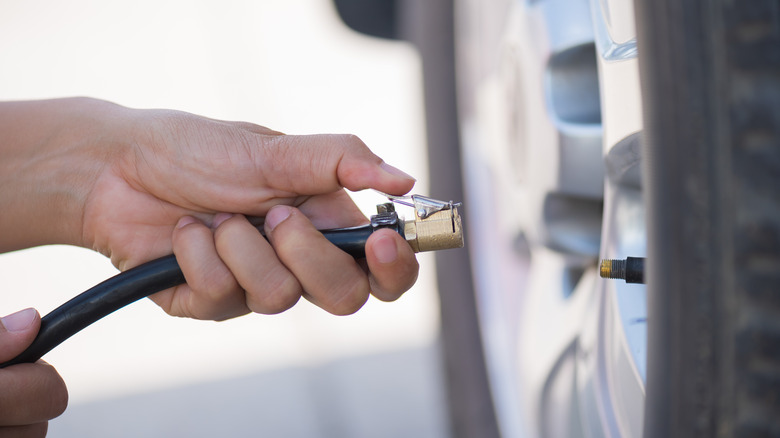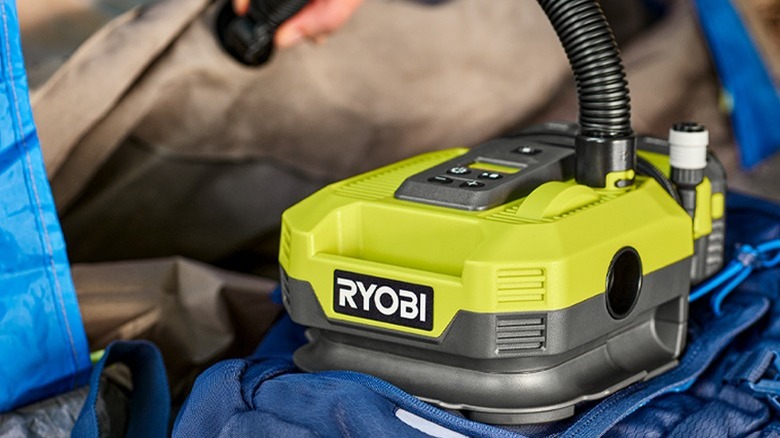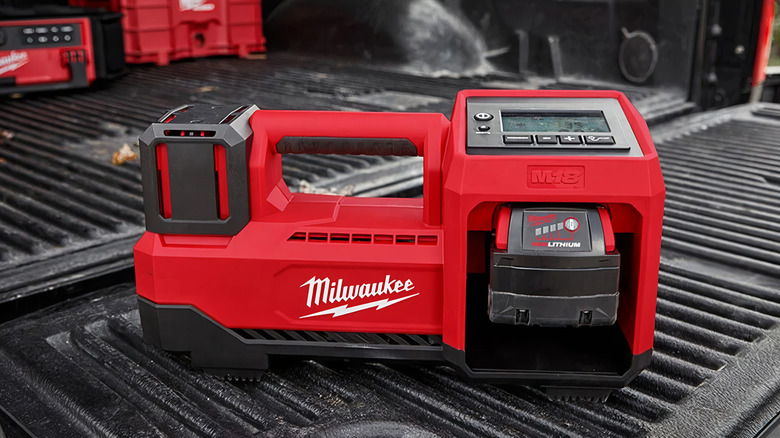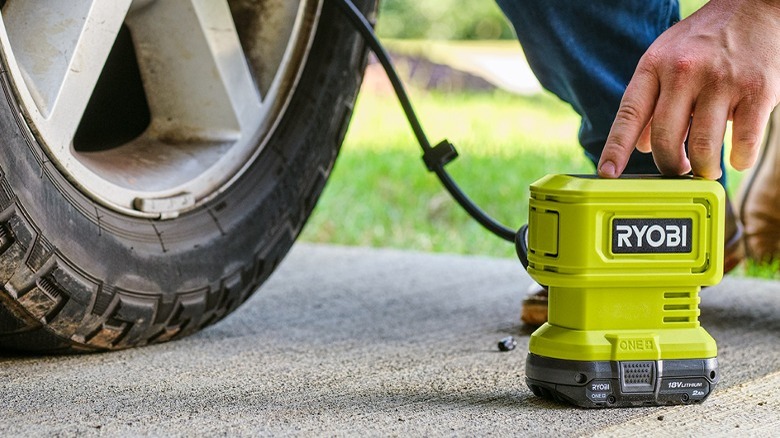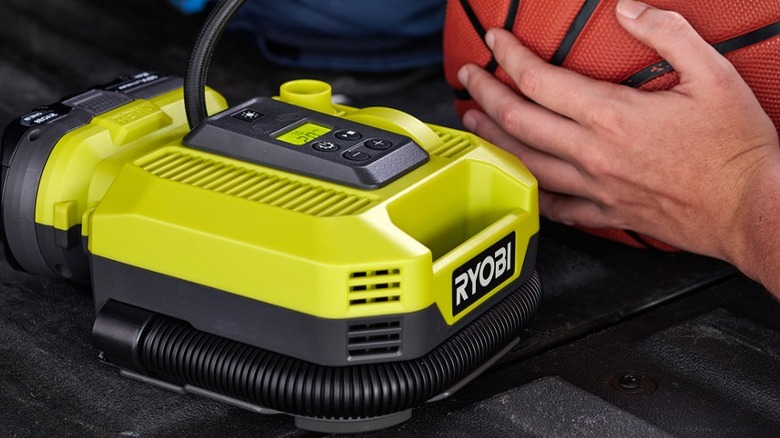Ryobi Vs. Milwaukee 18V Tire Inflator: What's The Difference Between These Air Pumps?
Keeping the tires properly inflated in your vehicle is important. Not only does it impact your gas mileage, but it also ensures that you're getting proper traction on the road. Of course, you always have the option to put a few quarters into an air compressor at your local gas station, but it's a lot more convenient to have your own. You want to make sure you choose a good one, though.
Ryobi and Milwaukee are both considered to be among the best power tool brands on the market. Each of them makes a tire inflator which you can use to keep your machines rolling smoothly. Not only that, but each brand also offers cordless versions that are powered by their respective 18V battery systems, allowing you to take them camping and off-roading, or even just keep them in your car to have in case of an emergency. Milwaukee makes the 18V Cordless Tire Inflator as part of its extensive M18 tool system in this size.
Meanwhile, Ryobi currently has two 18V units on offer: the 18V One+ Dual Function Digital Inflator/Deflator, and one of the newer additions to the Ryobi line, the smaller 18V One+ High Pressure Digital Inflator. That said, none of these machines are identical. There are several key differences in the specifications and feature sets, so you might want to take a look at what each of them does differently before you commit to a purchase.
Ryobi Vs. Milwaukee 18V Tire Inflator: performance
Arguably the most important aspect when it comes to almost any power tool is its performance specifications. When it comes to tire inflators, that means we're going to be taking a look at the volume and pressure of the air that it can put out when filling a tire. These metrics will determine how quickly each of these tools can inflate a tire, as well as the maximum amount of pressure they can apply.
Starting with the pressure, the Milwaukee M18 18V Cordless Tire Inflator is rated to deliver a maximum pressure of 150 PSI. Meanwhile, both the Ryobi High Pressure Digital Inflator and the Ryobi Dual Function Digital Inflator/Deflator promise to output up to 160 PSI. This means the Ryobi models are a bit more powerful, but not by enough to merit much concern. The average car tire has a recommended pressure somewhere between 28 and 36 PSI, so you should have more than enough headroom for whatever it is you're looking to inflate.
Pressure can imply a higher fill speed, but other factors like hose size and connectors can play a role as well. Neither the Milwaukee M18 nor the Ryobi High Pressure reports their fill speed on their respective websites, though Milwaukee does state that its "high efficiency motor tops-off 33" light truck tires in under 1 minute." The Ryobi Dual Function Digital Inflator/Deflator, on the other hand, has a much wider hose a reports a volume inflation of up to 16 SCFM (standard cubic feet per minute.) Sufficed to say, that's pretty fast.
Ryobi Vs. Milwaukee 18V Tire Inflator: design
Now let's take a look at the differences in the way these tools were designed. All three are cordless models that are powered by their manufacturer's respective proprietary 18V battery systems and all three are small and portable, but they're still each quite unique.
The Milwaukee has a long and narrow design with a built-in ergonomic handle, a digital interface, and anti-vibration rubber feet on the base. It comes with a 36-inch inflation hose that has an all-brass Schrader chuck. There is also a compartment built into the body of the device for hose and nozzle storage.
As for the Ryobi models, the High Pressure Digital Inflator is the smallest unit of the bunch with a slim, upright design. It has a small, digital interface on top, a 24-inch hose with an integrated hose clip, and an air chuck that's designed to fit standard ¼-inch and 8-millimeter Shrader valves. This hose is made to wrap around the center of the device when it's not in use. The body also has an onboard accessory storage compartment.
The Dual Function Digital Inflator/Deflator, on the other hand, has a wider and flatter design with onboard hose storage in the back and a carrying handle in the front. Like the others, it has a digital interface on top. It also has a built-in LED work light which can come in handy if you have to fill a tire at night, and it has onboard accessory storage. It comes with both high-pressure and high-velocity hoses.
Ryobi Vs. Milwaukee 18V Tire Inflator: features
Each of these units also includes several special features that might help influence your decision. One of the tools Milwaukee has in its arsenal is a proprietary smart feature called Truefill Technology. This allows you to set a desired pressure, monitor the pressure of the tire as it's filling it, and then automatically shut off the inflator once the tire reaches the desired PSI. This means that you won't have to keep stopping to check the pressure of the tire as you fill it, and you won't have to worry about accidentally overfilling it. This device can also be programmed to hold up to 4 PSI memory presets, making it easy to swap between multiple vehicles that might require different amounts of pressure without having to look up and program the desired PSI into the inflator each time.
The Ryobi's have a few features of its own, though. Both have its own auto-shutoff feature that stops inflation when a tire has reached a desired PSI, though it is admittedly less advanced than the Milwaukee one, which waits for pressure to stabilize before checking pressure and filling. The main advantage of the Dual Function Digital Inflator/Deflator over the other options is, as the name implies, that it has high-volume deflation capabilities in addition to its high-volume inflation ones. This probably won't come up very often with tires, but those who also need to deflate air mattresses and pool toys in the summer will probably appreciate this extra feature.
Ryobi Vs. Milwaukee 18V Tire Inflator: price
Now, once you've taken all of the capabilities of each of these devices into account, there's one last factor left to consider: the price. Milwaukee tends to have the better reputation when it comes to power and build quality, but Ryobi generally takes the point when it comes to price, and that certainly seems to be the case here.
The Milwaukee M18 18V Cordless Tire Inflator currently retails for $179.00 across most major distributors–and that's just for the tool alone. That's a pretty steep price for a tool that's designed to blow air. Even home mechanics who have already invested heavily in the Milwaukee M18 battery system may have a hard time spending that kind of money on an inflation tool.
In contrast to this, you can get the Ryobi High Pressure Digital Inflator for $39.97 alone or for $89.97 as part of a kit that includes a 2AH battery and charger. Similarly, the Dual Function Digital Inflator/Deflator goes for $79.97 as a stand-alone tool or $129.97 for a kit that includes the same Ryobi One+ 2AH battery and charger. These are both significantly more reasonable price-points.
